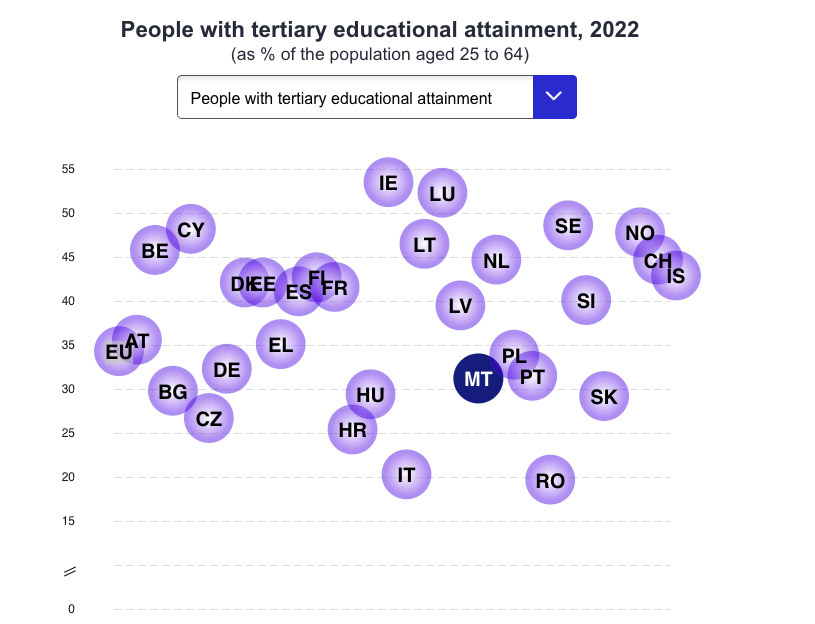Although Maltese students constituted the majority of enrolments at both post-secondary and tertiary levels, data published by the National Statistics Office (NSO) shows a decline in local student enrolment for the academic year 2021-2022.
The data, published on Tuesday, indicates that Maltese students accounted for 75.3% of students enrolled in tertiary education between 2021 and 2022, while foreigners accounted for 24.7%.
According to the data, the number of Maltese students enrolled in tertiary education between 2020 and 2021 totalled 15,103, but this number dropped to 14,326 the following year.
The National Statistics Office further reported that international students comprised 20.5% of the total student population at the post-secondary and tertiary levels. At the post-secondary level, most students were under 20 years old (88.9% ), and international students accounted for 12.1% of the total enrolments.
The majority of post-secondary students were enrolled in state-run institutions (86.2%), and more than half of the students were enrolled in vocational study programs, with ‘services’ being the most popular field (26.1%)
European data
The latest data from Malta indicates that while there has been an overall increase of 2.5% in student enrolment in post-secondary and tertiary institutions during the academic year 2021-2022, when compared to the preceding academic year, there is still a long way to go to catch up with European counterparts.
According to the latest Eurostat data, in 2022, the percentage of the population with tertiary-level education in Malta stood at 31.2%, a drop from 31.7% in the previous year and still below the overall EU average of 34.3%.

Percentage of population with tertiary education. Source: Eurostat
According to the European Commission’s Education and Training Monitor report, which was published in May 2022, the tertiary educational attainment rate of people aged 25-34 in Malta remained stable up until 2020, standing at 40.1%, which is slightly below the EU-level target of 45% that has been set as part of the EU-wide 2030 Sustainable Development Goals.
This contrasts with Malta’s public expenditure on education, which, according to the European Commission, is above the EU average and increased by 61.5% between 2010 and 2019. In 2019, the Maltese government’s expenditure on education was 5.3% of GDP, compared to the EU average of 4.7%.
“Given low education outcomes, this suggests some challenges in the efficiency and effectiveness of spending and highlights the need for strengthening the evaluation of investments in education and training,” the report remarks.















The Educational Disaster shows up through the Political BS of the Labour Government.
10 years of education 5 elementary + 5 secondary , Result reduced level of knowledge suitable for Tertiary Studies.
MCAST has failed its mission, because usually these are the ones that are suitable for vocational work , where wages are very good . But with CHEAP Labour competition where will these go? Drivers with the ministers????
I wonder how much of this data has to do with the syllabi and exams being set by Matsec? How certain are we that the exams prepared by Matsec are truly the standard they are meant to be? Or are these academics so out of touch with the world that they make an O level paper more akin to one which is meant for university? One only need to take a look at the Maltese Mataec and see how ridiculous this has become. And what is this obsession with selecting literature which is morbid and wrist slitting? Death, depression, anxiety – are the texts selected even even age appropriate for 13-15yr olds? There is a world of opportunity out there for new generations and tertiary education is increasingly becoming less attractive. To our detriment as a society.